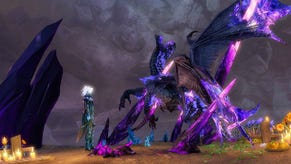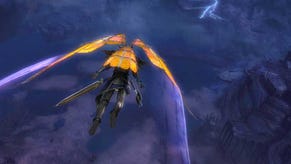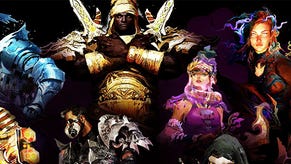Guild Wars 2: next-gen consoles and the MMO conflict
Xbox One and PS4 will finally put major MMOs into the hands of console gamers, but will this new direction impact the genre on PC? ArenaNet isn't worried. Guild Wars 2 lead content designer Mike Zadorojny speaks to Dave Owen in London.
“There’s a barrier to entry when you’re talking about a subscription for an online service. With Guild Wars 2 you play the game for free. The console model conflicts with that.”
The fact that some major MMOs will be arriving on next-gen consoles was one of the more exciting pieces of news to emerge from E3. Both Microsoft and Sony were keen to show off that the likes of The Elder Scrolls Online and Final Fantasy XIV will be available on their systems, alongside MMO-influenced games such as Ubisoft’s The Division and Bungie’s ambitious Destiny. It seems that console gamers will finally be able to say goodbye to sunlight and lose themselves in the huge online worlds that PC gamers have been enjoying for years.
“We’ve always been a very PC-centric company,” says Mike Zadorojny of Guild Wars 2 developer ArenaNet. “The PC is where we can really show off what we’re doing.”
Sticking with the MMORPG genre’s traditional stomping ground has paid off. While the MMO market has struggled recently, Guild Wars 2 launched in August 2012 to rave reviews and sales of 3 million copies before the end of the year. This success was in no small part down to ArenaNet’s attitude toward subscription fees – Guild Wars 2 doesn’t have any. Players make a one-off payment for unlimited access to the game.
This is one reason among many why the game is unlikely to arrive on next-gen consoles.
“There’s a barrier to entry when you’re talking about a subscription for an online service. With Guild Wars 2 you play the game for free. The console model conflicts with that.”
This is particularly true now that the PlayStation 4 will require a subscription to PlayStation Plus for players to go online.
“For us it’s about how we can develop exciting and engaging games for the PC. There’s always been a natural competition of consoles versus PC.” He shrugs as he considers what he saw from Microsoft and Sony at E3. “I don’t think there’s anything we’ve seen that’s alarming.”
In fact, Zadorojny greets almost any mention of the next-gen consoles with indifference. The Guild Wars 2 team is hugely proud to develop for PC. This leaves them as spectators to a re-ignited console war where the true extent and application of a number of services is yet to be fully revealed, let alone tested. To Zadorojny, the cloud, much touted by Microsoft as the key to true next-gen gaming, is an “interesting tool.” DRM “wasn’t really something that would affect MMOs.” Destiny, a game with more in common to Guild Wars 2 than at first meets the eye, “doesn’t necessarily impact on what we’re doing or where we’re going.”
Ahead of the curve
ArenaNet is so confident because is feel that it's well ahead of what the next-gen consoles will have to offer. While consoles slowly creep toward embracing episodic content and rolling updates, Guild Wars 2 is making it a priority. ArenaNet plans to leave the consoles in its dust.
“The ultimate goal right now is to give content to the players every two weeks. We’re trying to build at a similar pace to television shows. Tune in next week for more excitement! Every two weeks we’ll have new stories and quests and puzzles. We’re only going to get faster and better.”
While they’ve become a staple of the PC gaming experience, rolling updates have always been more difficult to integrate on consoles.
“With certification and sign off it can be very challenging on consoles,” says Zadorojny. “The idea of a persistent world is the holy grail for MMOs. If you can continually introduce new and interesting content to your fans they’ll become engaged and attached to a story, to the characters, to the world. Again, it’s like being invested in a television show.”
The comparison to television doesn’t adequately cover his ambition. After all, games are an interactive medium, and Zadorojny believes that on PC they can play to that strength in a way consoles simply cannot.
“When we launched we had dynamic events. Those took traditional MMO quests and iterated on that so that it reacted dynamically to the world. Now we’re iterating on that again to think: how do we get the game to iterate on the players? How do you get the story to change based on what the players are doing?
“In terms of how fast we’re iterating at this point... It’s extremely hard to do that while you’re working on a console platform.”
There are any number of PC MMORPGs that have enjoyed lifespans console games can only dream of. Perhaps ArenaNet is looking to the Jagex-developed RuneScape, which has successfully deployed weekly updates for much of it 12 years at the top of the free-to-play MMORPG pile.
“We did Guild Wars for five or six years before we even got to the details for Guild Wars 2. We’re really focused on this product. Nothing’s off the table [when it comes to launching full expansion packs] and it depends where technology goes. But right now we’re really focused on providing fans with content updates as often as we can.”
As next-gen approaches, console gamers are for the first time faced with the prospect of high profile games with persistent, evolving worlds. Bungie, for instance, plans to evolve Destiny over the course of a decade and multiple platforms (although PC may well not be one of them). It’s a new frontier for console games, and its explorers could do a lot worse than follow in the footsteps of Guild Wars 2. You get the impression, however, that the MMO's creators would simply glance back over their shoulders with an indifferent shrug.








